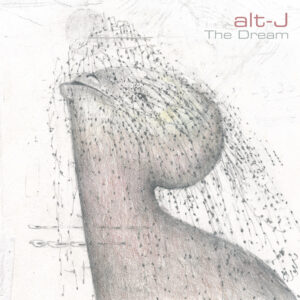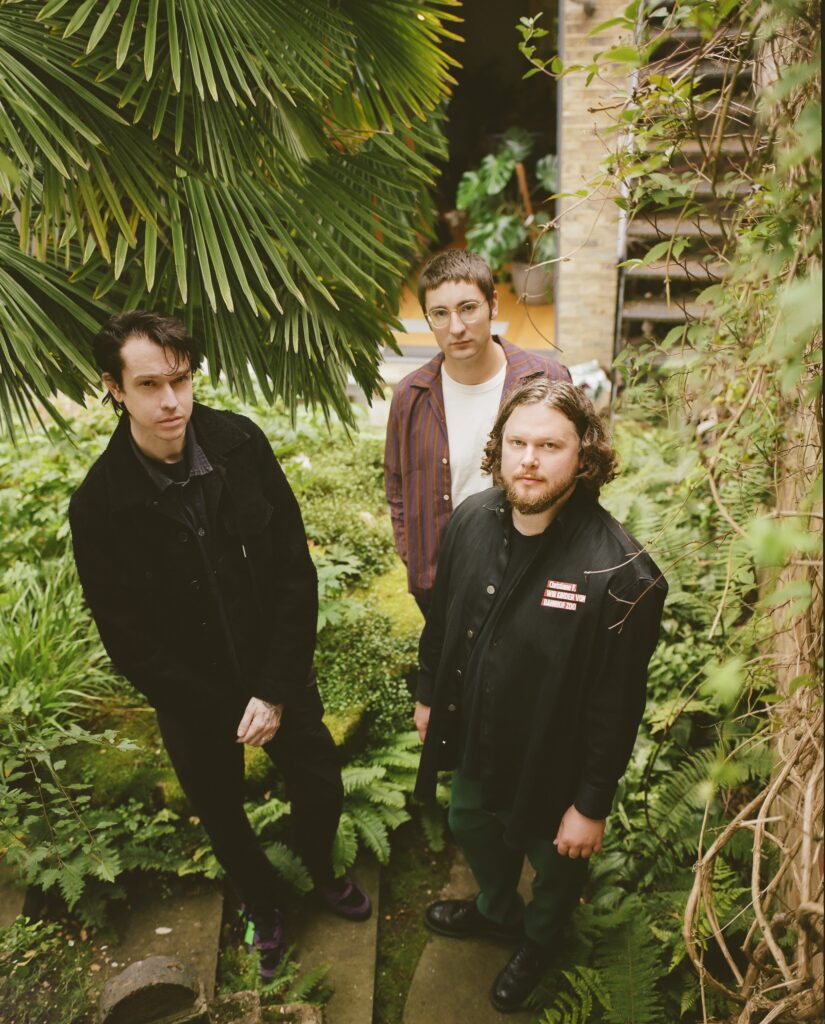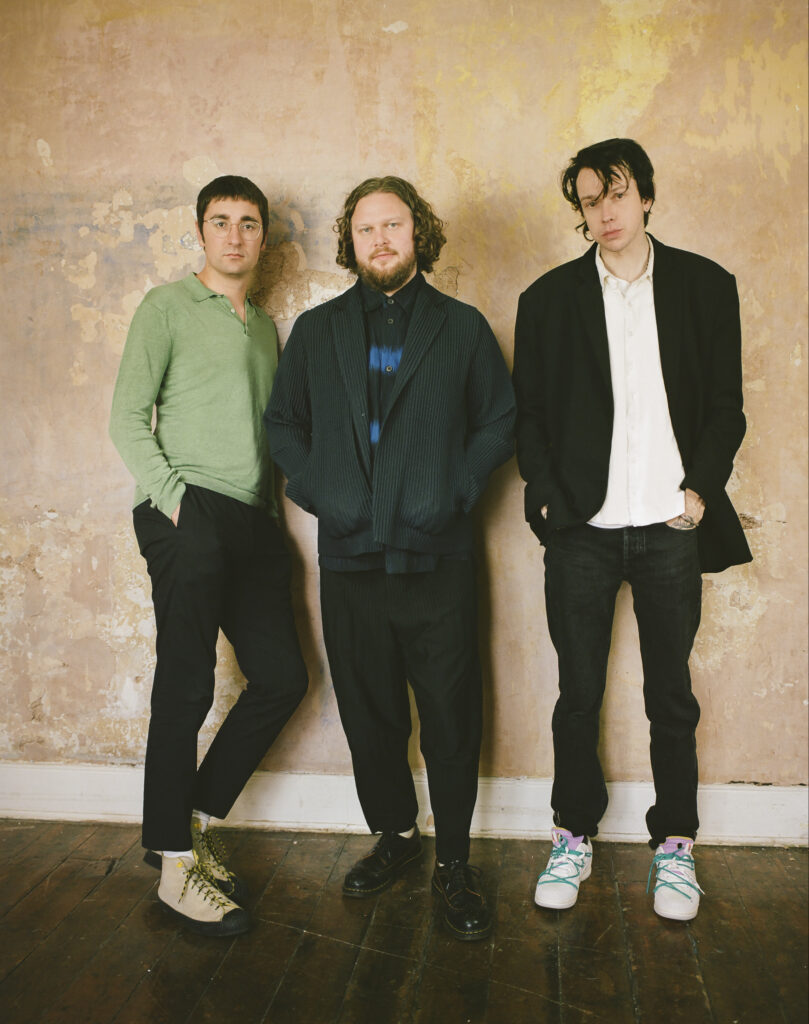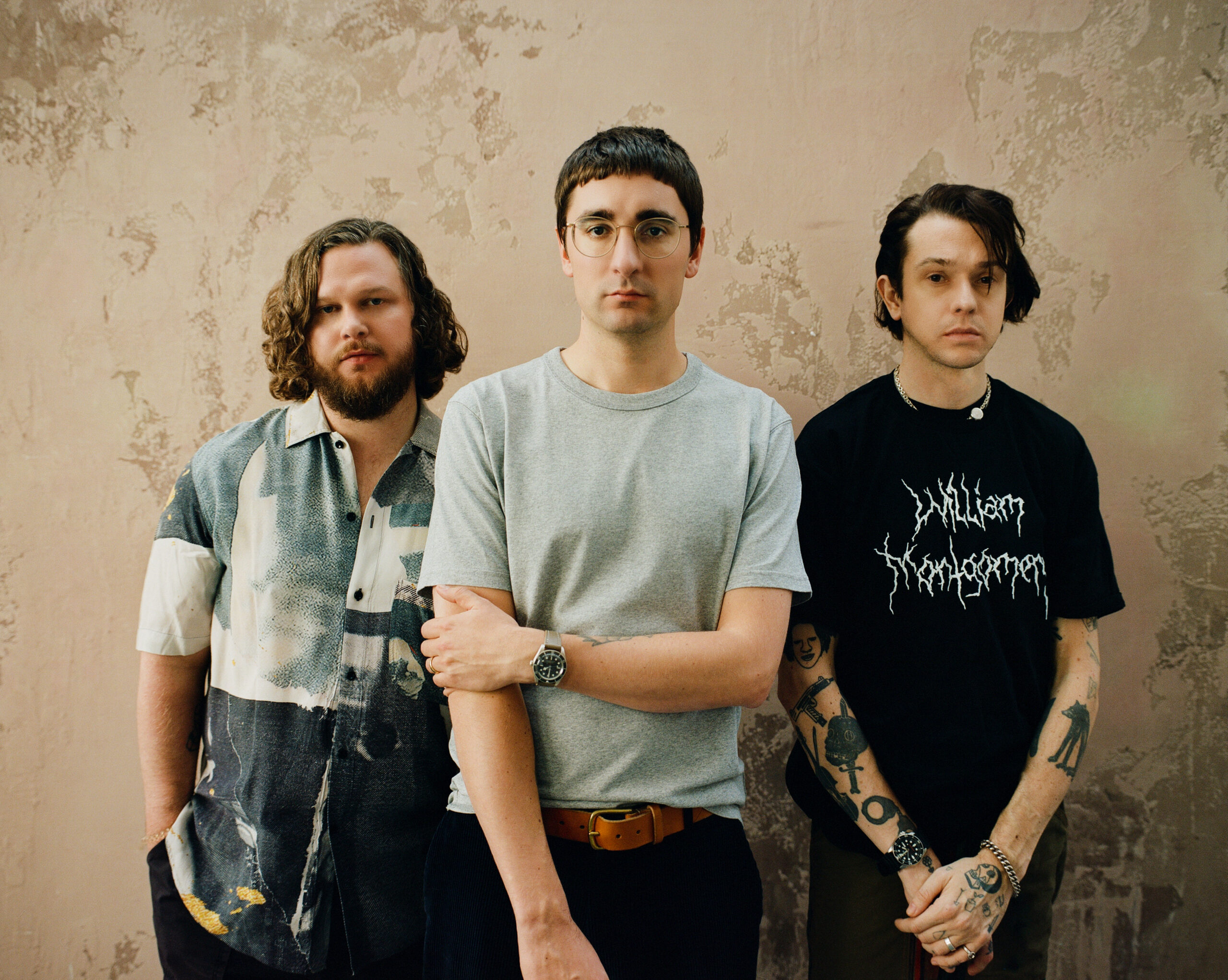Foto-© George Muncey
Stagnation oder Weiterentwicklung? Auf ihrem vierten Album, The Dream, wählt das britische Trio den Weg der Kontinuität und wirkt dabei erstaunlich mutig. Auch im Interview trauen sich Joe Newman und Gus Unger-Hamilton mehr denn je heraus. Was vielleicht auch daran liegen mag, dass die zwei nicht wie geplant für Interviews im kalten Berlin sitzen, sondern kurzfristig doch vom heimischen Wohnzimmer zugeschaltet sind – es sieht kuschelig aus. Der Raum ist lichtdurchflutet, eine Frau mit Baby auf dem Arm läuft durchs Bild, später hört man das Neugeborene immer wieder verschiedenste Geräusche von sich geben und alt-J auch mal ausgelassen lachen.
Es folgt ein Gespräch über das Verstecken hinter der eigenen Stimme, über alternative Realitäten und über Evolution, auch wenn die Live-Shows wenig Innovation mit sich bringen.
 First we planned to meet in person for this interview, but the virus is still around and so you decided to cancel your plans to fly to Berlin. How do you feel right now? About the album? The release of The Dream?
First we planned to meet in person for this interview, but the virus is still around and so you decided to cancel your plans to fly to Berlin. How do you feel right now? About the album? The release of The Dream?
Gus Unger-Hamilton: It feels like we have to wait all the time. We delivered the record in June 2021, so we have to wait eight month until the release. Not only because of the Coronavirus. We could have released the album earlier, but for an act like us it’s not a great idea to bring out new music around Christmas … The good thing is, we have something to talk about right now. We don’t have much to say when we are a year into touring and people interview us. But now it’s like a fresh start, I love that.
Joe Newman: We are so proud of the new music! So we like to talk about it, but sometimes it feels like we can never really pay justice to the whole process in one interview, because even when we’ve finished an album we are still amongst the creative process and it’s all a big mist. We don’t have the distance to look at everything.
Gus: Right. It can take years for me to have an epiphany about a track.
Can you give an example for such an epiphany?
Joe: Gus, you said that you found your voice pretty annoying when you listened to the first album again.
Gus: Oh yes! I had a certain way of singing at that time and it made me realize how much I have evolved in terms of using my voice and how we record it now. At the beginning of our journey my voice was just very nasal…
Joe: It was affected. You were very open with us about it. You told us that you were putting on that voice, because you didn’t feel comfortable singing in a natural way. Therefore you almost had to hide behind this style.
Gus: It’s so true!
Why have you chosen the album title The Dream? It feels like irony in these weird times.
Joe: We all kept a list for possible names and there were a lot of really silly, ironic ones – believe me. But it was very hard for us to agree for one. Our drummer Thom came up with The Dream, which is also the title of a Picasso painting. It’s a name that no one can really dislike!
Well, yes, agreed. But unfortunately you can’t say the same about Picasso.
Joe: We all love the painting, it’s just wow! We thought about using it for the artwork, but that proofed to be not so easy. (laughs) But yes, we like the title, because it’s so open for interpretation and also our songs have often a very dream-like quality. Chicago and Philadelphia are like strange, troubled dreams…
Gus: There’s a strong disconnect from reality.
Joe: Exactly. And also this feeling from the last two years where time has passed in this very unsettling way – it’s like waking up from a dream. When you’re not really sure what time of the day, week and year it is. We felt like we were in this strange half-asleep state…
Gus: This facelessness to the days, weeks and months – especially when we were in lockdown. It makes you pretty disorientated and that is similar to certain types of dreams.

It feels like you try out more with this record – a bigger sound, lyric-wise you create a very diverse imagery. Where does this bravery come from?
Gus: Our plan was even bigger. Actually, The Dream that you heard is not what we had in mind. We planned a bigger album, but we couldn’t do it, because we had some Vinyl issues. In terms of running time we thought about releasing a larger album. Definitely, we didn’t want to give another eight songs album to our fans. With the pandemic we were allowed a lot more time, but not more expectation on us in terms of creating or finishing work. It meant a lot of our ideas could mature and we could revisit songs with a greater vision. I think that’s were the bigger sound comes from and possibly the bravery. Also with the pandemic we sort of thought: fuck it! There’s this blanket over the whole world, that is slowly crashing us in a way. Why not, life is short! Let’s just do it this way.

I can imagine that it’s also helpful to have not too many people around to tell you what they want from you. The pandemic made us less connected with each other – as bad as it sounds, it can be helpful for the creative process.
Gus: For sure. When you write music you have to be in a space on your own, at least at first. To be offered an unknown amount of time in that point in your mind is a great breeding ground to write.
Are you scared of the blank page?
Joe: No, Gus always got ideas going on. I don’t often see him sitting down with a blank page. It’s almost unconscious. And he is great in documenting what he does. He’s very on it with making recordings and writing things down.
Gus: I’m industrious!
Joe: Yeah, you have always something in the fridge that you could get out and play around with.
Gus: I think you have to commit to preserve these moments of spontaneity. If you write something that you think sounds good – don’t revisit it without recording it first. You have to preserve the moment. If you don’t do this you could have lost the magic of the moment that could then potentially fuel the preparation for a new song.
You talked about bigger plans for this record. What exactly was in your way?
Joe: We had to cut some songs off the album, because there’s a big problem with getting vinyl made at the moment. We were told to make it on a single record for vinyl, which was difficult, because we had probably 15 songs, that was not gonna fit on one album. But we always like to make a nice package for our fans. Hopefully we can release some songs another time over the year in another form.
Gus: But what we took away from the album hasn’t reduced it to the degree that it is less an album. It’s probably more efficient. The things that we took out would just add things, glued together ideas between songs – like interludes. Well, it was an interesting exercise in cutting down and still be happy with the result.

I don’t know if that makes sense to you, but when you talk about limiting yourselves and compromise I have to think about streaming services … How do you feel about the Spotify Wrapped that you can get at the end of the year?
Joe: For a few years I was really excited about the results, but now I can’t be bothered that much. Usually there is a lot of old stuff on my playlist and it feels wrong to look forward to a listing of songs that are old anyway. Also, you know, streaming is probably better for labels than it is for artists.
Gus: Much better!
Joe: Right, that was an understatement! (laughs) But yeah, streaming has saved the music industry to a big extant. No one is worrying about piracy anymore, which is mad considering where we were ten years ago. It felt like the end at that time. But now? I try to be hopeful and see potential. I hope for a way for a new paid streaming model, but until then people also need to buy tickets, T-Shirts, vinyl an even – god – CD’s!
Gus: I mean, the Wrapped from Spotify is also just a trendy way of showing off their analytics. It feels like: Look how much data we have on you! Isn’t it fun that we know that you listened to „Killing in the Name“ 300 times this year? It’s sinister. (laughs) Also it would be so nice if we could think about better deals for bands, but this will not happen very soon, because the labels are businesses and we are just artists.
Joe: Plus, streaming is too cheap. Ten pounds for all the music in the world isn’t enough.
Why do you think there’s no real lobby for musicians?
Joe: Probably a lot of the smaller bands think it’s easier to fight on their own and not on behalf of everybody. You have to focus to persevere.
Gus: I think most musicians never thought they would make a career out of their art and so the money they make there’re incredibly proud of, but it’s probably not a fair representation of what could have made if it where spend more equally.

Do you ever thought that you would get so far with your band?
Gus: It’s funny, I just talked with my partner about this the other day. I feel like there are so many alternative realities that exist and I’m in the one where I am part of this successful band. I don’t feel like it’s real sometimes. It is nothing that I can overcome – realizing that’s what I do. Because I could have so easily not have done this. I would make so much more sense that I have done all the other things, the alternatives, rather than the one thing that I always wanted to do. It’s so unusual.
Is change or continuity more interesting for you?
Joe: Continuity for us is change. Change for us is continuity. We were never a band who had been stuck in one particular musical style. Even on our first record I think we wrote some really different songs and then we continued to do that on all our albums. I’m not trying to be clever with your question, it’s just like our continuity is evolution.
Thank you for answering my question in that way and telling me the truth: the question itself was mediocre and not adequate to your intellect.
Gus & Joe: No no no!
I’m just teasing you!
Joe: I don’t want to overanalyze it, but isn’t it interesting that you talk about continuity? That would mean by definition keeping it the same, right? Like in a film – you make sure that someone always wears the same hat. But at the same time continuity gives you that image of continuing something, like a shark that never stops swimming. But continuity and stasis are very different things. Continuity is a positive thing – as well as meaning keeping it the same it means keeping the momentum, keeping it forwards.
You made sure to tell me that you are proud of your new record. But is it also a better contemporary document of you or would you say a concert would represent you in a more accurate way?
Gus: For me the album is the thing that you bury to the ground and next generations, thousand of years later, will find it. That’s the thing that will document who you were at the time. A concert is replicating that process to the best of our ability without too much divergence into spontaneity.
Joe: When we do our concerts we don’t innovate that much. Is that fair to say?
Gus: Yeah, we don’t innovate, we recreate. The light show is pretty impressive and we won awards for that, so there might be some people who would argue that that is innovation and I know that Thom loves to perform drums. He would talk to you about an hour about his process doing that. But for us – we play the songs. So the album is the best way to show where we are at that time.
Joe: And I got the impression like you like the album at least a bit, so yeah, that’s making me happy.
alt-j live:
11.06.22 Tempelhof Sounds, Berlin










